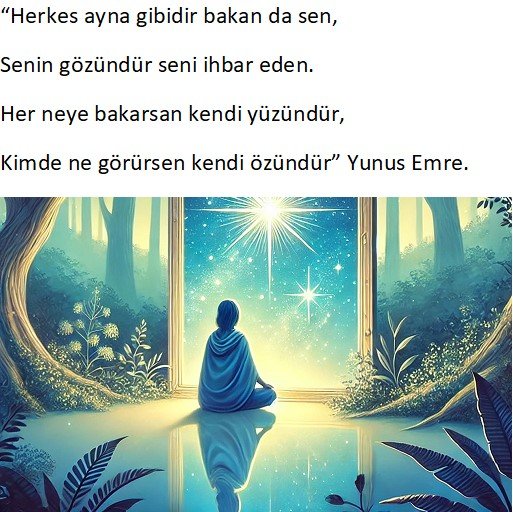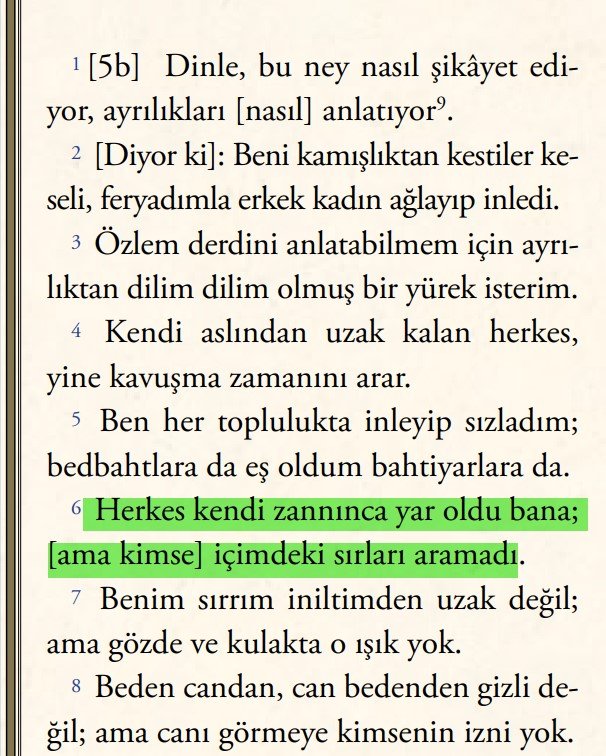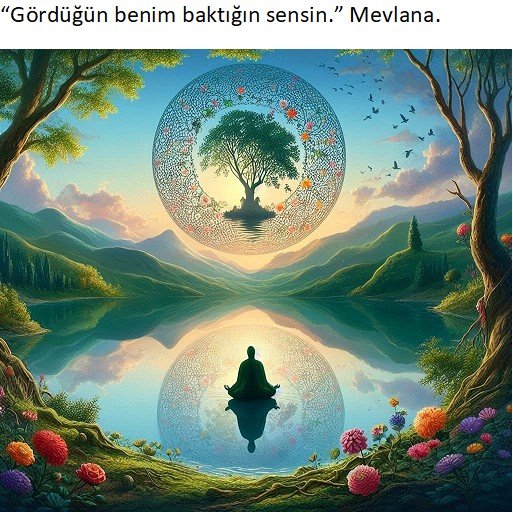IŞIK 1/THE LİGHT 1
KENDİ VE İNSAN.

Ayna, ayna söyledin mi o insana; sen bensin bende sen.
İnsan neye baktıysa kendinden bir parça gördü. Neye dokunduysa kendinden bir parça bıraktı. Neyi işittiyse çoğunlukla karşıdakinin zannı ile alakalıydı. Neyi inanarak düşündüyse ona dönüştü insan.
Bazen istediği şeylerde, bilinçsiz zihnin kararsızlık hali, karşısına engeller çıkarttı. Bazen gün karanlığında bekleyen örtülü korkuları, en vazgeçilmez fırsatları kâbusa çevirdi. Bazen de hiç anlamlandıramadığı mucizeler, umut ve inançla, etrafını sardı. Oluşumu dokuz ay tamamlanabilmesi bir ömür zincirinde ya bilinçli zihniyle ya da bilinçsizce kısıtlandı. Edilgen yapılı bu cümlenin asıl öznesi ‘İnsan’dı.
Ruh(öz,can), nefs, beden ve kalp boyutu ile bir bütün olan insan, varlığıyla, kendi benliğini bildi, tanıdı. Gözüyle gördü, kalbiyle baktı. Hakikatte, kendilerini acımasızca eleştirip kendin de gördüğü kusurları açığa çıkardığını fark etmeyen insan, görünürde ise bu eleştiri, kusur sahibinin- başkalarına- ait olduğunu zannetti. Asıl olan kendi iç yansımasıydı.
Peki, gördükleri buysa, baktıkları ‘hakikatte’ kendileri miydi?
“Vemâ yettebi’u ekśeruhum illâ zannâ(en)(c) inne-zzanne lâ yuġnî mine-lhakki şey-â(en)(c) inna(A)llâhe ‘alîmun bimâ yef’alûn(e)
Onların çoğu, hiçbir dayanağı olmayan zandan başka bir şeye uymazlar. Zan ise, gerçek adına hiçbir şey ifade etmez. Hiç şüphesiz Allah, onlar ne yapıyorsa hepsini hakkıyla bilmektedir. Yunus suresi 36. Ayet"

İnsan, kendi zannınca yar oldu birbirine. Kendi inandığı ölçütlere ve kendi bakış açısına göre bir kaba koyup şekillendirdi, değerlendirdi, yorumladı, birbirini. Kendince algıladığı, kendi zannettiği anlamları yükledi, birbirine. Yanılgının ötesinde bir haldi bu. Peki, hakikatin kalbinden bakabilseydi kendi hakikatini görebilir miydi?

Düşünce örüntülerinde olan şeylerin yaşantısında da vuku bulduğunu çok sonra idrak etti. Kendine yaşattıklarından dolayı da sürekli bir suçlu aradı. İnsanın insanla alıp veremediği, insanın insanda bulduğu huzuru kaosa çevirdiği, insanın insanla insanca yaşamasına olanak tanımadığı bir denge sorunuydu bu.
Kendi içindeki zıtlıkları, bir ahenk içinde yaşamayı bilendi insan. Kendi dışındaki dünyaya ölçüsü kadar yaklaşan…
For English;
SELF AND HUMAN
"Everyone is like a mirror, and you are the one who looks,
It is your eye that betrays you.
Whatever you look at, it is your own face,
Whatever you see in others is your own essence."Yunus Emre.
The mirror, Mirror; Did you tell that person? You are me, and I am you.
Whatever a person looked at, they saw a piece of themselves. Whatever they touched, they left a piece of themselves behind. Whatever they heard was mostly related to the perception of the other. Whatever they believed and thought, they transformed into it.
Sometimes, in the things they desired, the unconscious mind's state of indecision created obstacles. Sometimes, the hidden fears waiting in the darkness of the day turned the most irreplaceable opportunities into nightmares. At times, inexplicable miracles surrounded them with hope and faith. The completion of their formation, which took nine months, was either consciously or unconsciously restricted within the chain of a lifetime. The true subject of this passive construction was 'Human.'
Human, as a whole with the dimensions of the soul (essence, spirit), the self (ego, devil), the body, and the heart, knew and recognized their own self through their existence. They saw with their eyes, and looked with their heart. In reality, the person who ruthlessly criticized themselves and failed to realize that they were revealing the flaws they saw within, mistakenly believed that these criticisms and flaws belonged to others. What they could not see with their eyes but could understand when looking with their heart was their own inner reflection.
Then, if what they see is this, were they actually looking at themselves in 'reality'?
"What you see is me, and the one you are looking at is yourself."Mevlana.
“Vemâ yettebi’u ekśeruhum illâ zannâ(en)(c) inne-zzanne lâ yuġnî mine-lhakki şey-â(en)(c) inna(A)llâhe ‘alîmun bimâ yef’alûn(e)
"Most of them follow nothing but conjecture, which has no basis. And conjecture does not avail against the truth in any way. Surely, Allah knows exactly what they do." (Yunus, 10:36)
"Listen, how the reed complains, how it tells of separation.
[It says]: 'They cut me from the reed bed, and with my wailing, both men and women cry and moan.
To express the pain of longing, I need a heart torn into pieces by separation.
Everyone who has strayed from their origin seeks the time of reunion.
I have moaned in every gathering; I have been the companion of both the miserable and the joyful.
Everyone thought I was a friend according to their own perception; but no one searched for the secrets within me.
My secret is not far from my sigh; yet there is no light in the eyes or ears to perceive it.
The body is not hidden from the soul, nor the soul from the body; but no one has permission to see the soul.'"
Human, according to his own perception, became a reflection of one another. It placed and shaped others in a mold based on ıts own beliefs, ıts own perspective, evaluating, interpreting them. It assigned meanings, the meanings ıt perceived and thought to be true, to one another. This was a state beyond delusion. But, if ıt could look from the heart of truth, could ıt see his own truth?
It realized much later that the things in ıts thought patterns also manifested in ıts experiences. Because of what ıt made ıtself go through, ıt constantly searched for someone to blame. This was an issue of balance: the inability of humans to find peace with one another, turning the harmony they found in others into chaos, and failing to live with humanity in their interactions.
Human is the one who knows how to live the contradictions within themselves in harmony. They approach the world outside themselves to the extent of their own measure...
Congratulations, your post is upvoted by CCS curation trail from CCS - A community by witness @visionaer3003.
Vote for @visionaer3003 as witness.